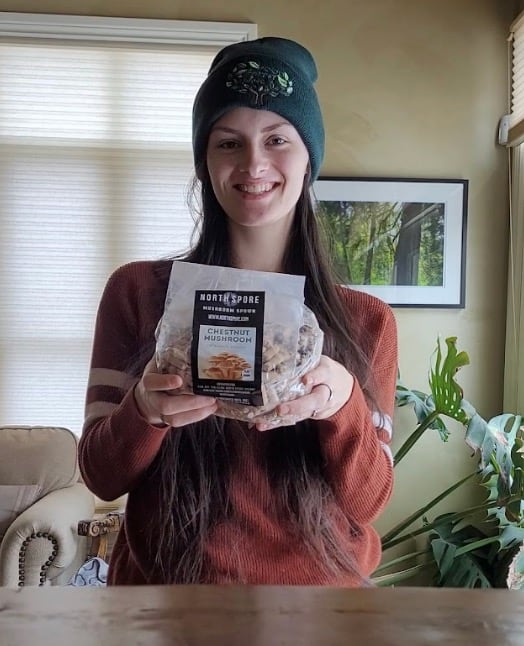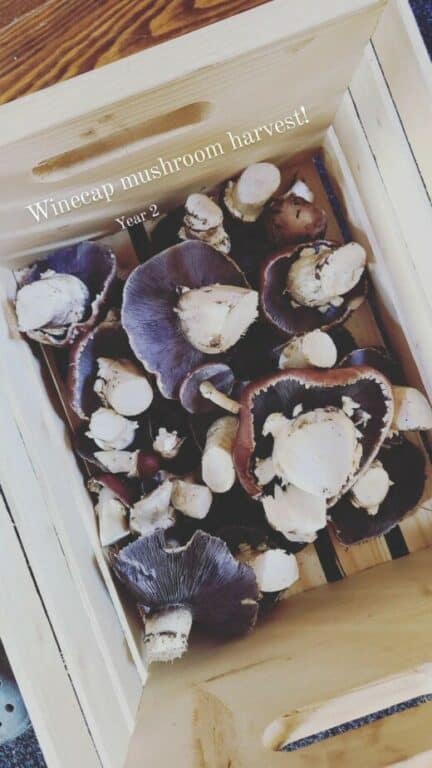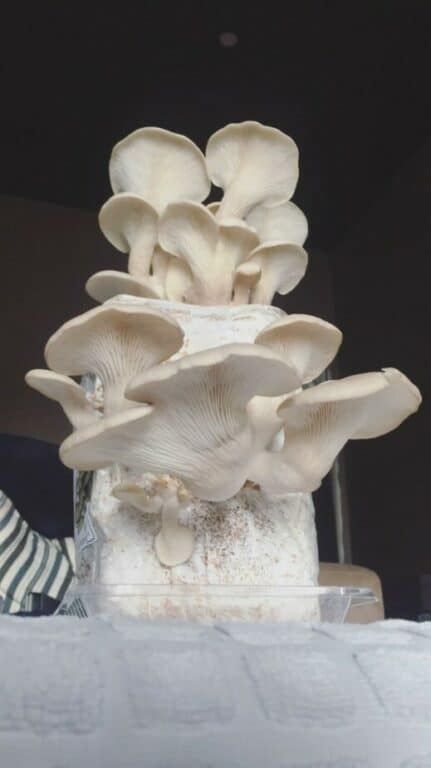This post may contain affiliate links. If you use these links to buy something we may earn a commission. Thanks.
Do you love mushrooms?
Well if that isn’t reason enough (or you don’t love mushrooms…), the 8 reasons below are detailed in ways that will prove an added benefit to your life.
You can save money by growing gourmet mushrooms
The cost savings of mushrooms might appear small but can be considerably conserving when employing the most sustainable methods available to you.
See: What it Costs to Grow Mushrooms (Indoor vs Outdoor)
For example, when you’ve decided to grow more than a single serving of lion’s mane you may want to graduate from a ready-to-fruit kit. Buying and growing liquid culture (or making it!) become fractionally cheap when 10x the yield of a typical high-quality kit emerges in your grow bin, mushroom bed, or mushroom log stack.
The more mushrooms you grow for eating, the fewer mushrooms (and maybe vegetables) you need to buy.
Mushrooms improve our span of health in numerous ways
Remember the time you felt so sick you couldn’t ‘do’ life? Health is the most valuable wealth we can have because we can’t do life once we degrade.
Multiple types of mushrooms have been shown to be exceptional contributors to functional longevity.
There’s more to read about the buried treasure of medicinal mushrooms (the amazing-tasting shiitake being one!).
Anyone seeking better health would benefit from including mushrooms in their diet. Either by growing it yourself or investing in supplements, or both!
Supplements don’t have to be boring—we absolutely treasure this nurturing mushroom hot chocolate mix. It’s a real treat when you can’t muster the energy to make it from scratch yourself.
I’ve often struggled with recalling memories on my own. To this day that is still something I work on, but the combination of trying to be more present in the present, consuming several kinds of mushrooms that we grow or forage for ourselves, and taking mushroom supplements (before we were able to grow and forage) helped dramatically.
Fresh gourmet mushrooms become accessible and are easy
The superior quality and purity of homegrown food are the cherries on top of accessibility. Not every grocery store even sells fresh lion’s mane, shiitake, or oysters.
I’ve never seen a King Stropharia (wine cap) available for sale—anywhere! The only place we can get them steps outside our front door—and what better place could there possibly be for food? Well, cultivated indoors for some situations.
Stores that do sell gourmet mushrooms currently offer a price too steep for the average mushroom-lover to justify sustaining.
As a beginner, we recommend tasting mushroom strains with ready-to-fruit kits before proceeding with high-yielding/high-savings grow methods.
For a discount on mushroom kits from North Spore, or any other modes of growing; use QUALITYSPAWN at checkout.

Kits are also a starting point that enables the discovery of your enjoyment of growing mushrooms. However, growing mushrooms from a kit differs from the many ways available. So, I’d say their primary function is a taste test!
Four invaluable skills are learned during the experience
A few skills can be gained when growing your own mushrooms.
- Growing your own food is an essential skill that the majority of people aren’t partaking in. Maintaining zero knowledge of producing some form of necessity is a growing risk.
- Foraging is an invaluable life skill because there is food growing all around us. We’ve become so familiar with food beyond the border that native foods have become exotic. Knowing how to spot native food such as mushrooms will help retain diversity. Inherently, mushroom identification will be easier after growing your own. There is a 100% chance that the mushrooms you want to cultivate are naturally growing somewhere outside.
- Local community building depending on where you live is an opportunity worth watering. If you need to outsource substrate find it locally. Growing medium will need to be sourced continuously to keep production going. So, why not nurture a close community with this purpose?
- Generating compost for your garden is a skill of many forms—finding ways to turn what we think is “waste” into energy for something else. Your boiled potato water—cooled—and spent mushroom material are examples of “waste” products not destined for the drain or garbage bag. The earth will accept these products as they are, and turn them into new life.
Why should you learn skills? You’ll be more valuable!
This article was originally published on foodforestliving.com. If it is now published on any other site, it was done without permission from the copyright owner.
You can make good money with a low barrier to entry
Mushrooms are easy to start and have the potential for high profits. What better combination for a business is there?
Mushroom cultivation has plenty of room for maximizing profit margins.
Most small-scale mushroom growers buy substrate and liquid culture spawn. Producing your own substrate and producing your own spore would be the cheapest way to mitigate operating costs.
It isn’t typical for a mushroom grower to produce everything themselves because some steps (such as producing your own mushroom spore cultures) have more involvement than they are worth. Most growers find it simple enough to purchase liquid cultures and grow them to last for more batches of mushroom-making than the original product.
Plus—the more mushrooms you grow, the bigger discount you get on high quantities of liquid culture purchases.
If you have access to land, producing your own substrate might easily be worth the cost. For us, we have the means to make fresh woodchips and cut fresh trees for mushroom logs.
On the other hand, it currently makes little sense for our woodland to produce straw.
For most local areas, there is little shortage of options when it comes to selling. Most people and places are currently missing out on gourmet shrooms because the only options they have are buttons and portobello! (…which are the same type of mushroom just at different growth stages)
Places that are likely to be thrilled about buying your mushrooms are:
- Upscale restaurants
- Health food or specialty grocery stores
- Your neighbors—sell directly to people
- Farmer’s market customers—be a vendor!
If you’re interested in working for yourself and a low barrier to entry is motivating—look no further. You found a decent business idea that someone will always be hungry for.
Mushroom grow ops can be started in a short time
Most setups are extremely cheap and easy which makes starting mushrooms a very small ladder to climb.
You can read about several examples of everyday people mushroom cultivation setups here. Real people listed out all the equipment they decided to purchase to get started with growing mushrooms.
After that conversation, I was inspired to write this article because no matter which way you do it, mushrooms are pretty simple!
Related post: How long does it take to make mushroom logs?
Growing mushrooms can be simple and quite passive
Before starting an adventure such as mushroom cultivation—we need answers about the workload. What did we do? We gathered insights from indoor growers, combined our own experience of outdoor growing, and came to a conclusion.
Is growing mushrooms a lot of work?
Growing mushrooms outdoors for personal use requires extremely minimal effort once per week in season. Growing mushrooms outdoors for commercial purposes can require a lot of regular heavy lifting. Regardless, you yield a lot for a relatively low proportion of work.
Growing mushrooms isn’t always a walk in the park, but personal-use outdoor grow ops sure feel that way.
Outdoor operations are very self-sufficient; meaning very little work, but are limited to seasonal yields and climate temper.
For example, small-scale and personal-use mushroom logs aren’t much work at all. But when you start scaling up, it becomes frequent heavy lifting instead of a few minutes of maintenance once per week.
Indoor operations are less heavy lifting but inherently more work and monitoring. Not only do you need to manage the mushroom mediums, but simulate and control an ideal environment.
Mushroom cultivation is most passive for homesteaders and hobbyists with outdoor spaces. So don’t stay bound to the button type when gourmet strains are painless to grow!
See: 4 Fail-Proof Mushrooms to Grow Outside
Mushroom cultivation produces a useful byproduct
It doesn’t matter if you grow mushrooms indoors, outdoors, or both! Either way, you’ll be producing some rich mushroom compost.
Mushrooms have many roles in life. The gourmet kind that we like to grow, love doing their thing and hanging out by hardwood trees.
When hardwood trees fall mushrooms will take hold and consume the material which helps make essential nutrients available for plant life.
Plants like fruit trees love fungally dominated soil. Any perennial garden would graciously reward those who apply mushroom compost.
If you or a friend have a perennial garden, your mushroom compost will make a great gift!
For a simple indoor mushroom growing setup, look no further than this kit. DIY is overwhelming sometimes when you’re working with parts and pieces you don’t understand. It’s how I felt. Plus, this looks nicer than anything I could possibly slap together!


Conclusion
In a nutshell, growing mushrooms can:
- Save you money
- Increase span of health
- Provide easy access to unique food
- Teach you valuable skills
- Become a profitable low-barrier business
- Provide quick results
- Be done easily
- Generate valuable compost
Personally, I find growing mushrooms outside to be more passive and cheaper to do; either with beds or logs.
Related posts:
- Are Mushroom Logs Worth It? All You Need to Know
- 10 Best Mushrooms Easy to Grow in a Cold Climate Food Forest
Recent Posts
There’s no shortage of full-sun ground covers for zone 4 climates! Each plant in this list can withstand the frigid temperatures and also enjoy the hot sun in summer. Full sun means that a plant...
There's no shortage of full sun ground covers, not even in zone 3! Zone 3 climates offer hot but short-lived summers and very cold winters. So each plant in this list can withstand the frigid...
